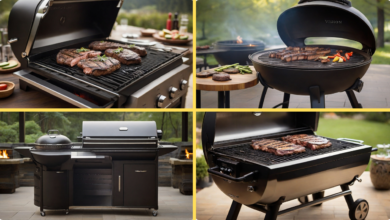![Grill Your Veggies to Perfection: A Step-by-Step Guide [with Stats and Tips] for How to Grill Veggies on the Grill 1](https://thegrillshopboyertown.com/wp-content/uploads/2023/04/tamlier_unsplash_Grill-Your-Veggies-to-Perfection-3A-A-Step-by-Step-Guide--5Bwith-Stats-and-Tips-5D-for-How-to-Grill-Veggies-on-the-Grill_1680697698.webp)
Short answer: How to grill veggies on the grill
Preheat the grill and brush veggies with oil for even cooking. Arrange in a single layer, turning occasionally until tender-crisp. Popular veggies to grill include zucchini, peppers, onions, corn, asparagus and eggplant.
Different methods for grilling veggies
Grilling is one of the most popular and beloved cooking methods across the globe. The intense heat and smoky flavors add a rich depth to any dish that cannot be replicated by any other cooking method. While grilling meats may be the go-to option for many grill masters, vegetables deserve their fair share of attention too.
Grilled vegetables not only offer a healthy alternative but also serve as an excellent complement to meats or as the star of the show in vegetarian dishes. Grilling veggies also encourages consumption of lesser liked veggies, such as Brussels sprouts or eggplant, due to their delightful charred flavor.
But alas, not all veggies are created equal when it comes to grilling. So, let’s dive into different methods for grilling veggies that will take your grilling game to a whole new level.
1. Direct Heat – This method involves placing your vegetables directly over high heat on the grill grates. This is best suited for smaller-sized or cut-up vegetable pieces like cherry tomatoes or small sliced onions which get done quickly.
2. Indirect Heat – When you have larger and thicker-cut vegetables such as bell peppers or squash, direct heat isn’t always sufficient enough to cook them through without burning them on the outside first. So, using indirect heat is essential in achieving evenly cooked veggies with no charring. To use this method place your vegetable onto a cooler, unlit side of your grill away from direct flames.
3. Skewers (aka kabobs)- Using skewers or large wooden picks can make turning delicate vegetables (such as mushrooms which fall apart easily) an easy task without worry about losing them beneath the grates while cooking.
4.Marinades- An hour before cooking submerging carrots,potatoes in olive oil &salt-seasoned marinade adds flavor and prevent veggie burning at higher temperatures.
5.Grill Baskets- Using grill baskets can help retain smaller cut-up veggies from falling through the grill grates while cooking like cherry tomatoes or asparagus spears.
Finally, after choosing a grilling method and appropriate vegetables to use, seasoning is vital. Seasoning vegetables before tossing them onto the grill imparts flavor far beyond just salt and pepper. Using rubs or marinades such as cumin-spiced corn, garlic-infused asparagus or rosemary roasted zucchini elevate these delicious dishes from boring to exotic.
Grilled vegetables truly are the unsung hero of outdoor cooking. With these different methods and seasonings highlighted above, you’re sure to up your grilling game when it comes to veggies. Make this summer filled with healthy, flavorful grilled veggie dishes for your friends and family. Happy Grilling!
Tips and tricks for getting the perfect char on your grilled veggies
Grilling is one of the most satisfying ways to cook, but it’s not just about throwing meat on a flame. Vegetables are also perfect for grilling because they’re a great way to add flavor and nuance without all the fat and calories that can come with other dishes.
Grilled vegetables offer a smoky, robust flavor that will take your taste buds on a journey. And even better? It’s very easy to achieve! By mastering the art of getting the perfect char on your grilled veggies, you’ll bring out their sweetness and enhance their natural flavors- making each bite an explosion of taste in your mouth.
1. Choose the Right Veggies
Not all vegetables are cut out for grilling! If you want perfectly grilled vegetables that have been imbued with rich smokey flavors then choose hearty ones such as eggplant or bell peppers that have enough flesh so as to avoid burning or turning mushy.
2. Prep Work Is Key
To prepare your vegetable for grilling, make sure they’re cut into sizes suitable for cooking evenly over fire. Cut them lengthwise so they’ll lie flat on the grates – this will help them cook uniformly while ensuring maximum surface area gets caramelized.
Another essential prep work tip is marinating – use whatever marinade strikes your fancy; olive oil, soy sauce, balsamic vinegar mixtures are always good options. Marinating infuses veggies with an extra depth of flavour besides locking the moisture inside which is essential when working with heat!
3. Hot Grill = Perfect Veggies
Always begin by heating up your grill before adding any veggies onto it. This allows you to attain a nice crustiness since burning hot temperatures quickly sear exterior surfaces while retaining inner juiciness preventing sticking and perforation risks.
Pro-tip: To get those visually stunning grill marks on your veggies, turn them only once on each side!
4. Timing Is Everything
It’s important not to overcook your vegetables. This will cause them to turn out bland and lifeless as they lose their natural flavor due to burning or disintegration. Timing is crucial; therefore, it’s important to monitor how long the veggies need to be grilled.
Fruits like grapefruit, pineapple or peaches take about 2-3 minutes per side while red peppers can take up to 7-8 minutes, so keep an eye on them!
5. Add Some Extra Flavors
Grilled vegetables offer a blank canvas for exploring different delectable cuisines! After cooking and off the grill, sprinkle some extra parmesan cheese, crumbled feta cheese, za’atar spice mix or drizzle balsamic glaze for that mind-blowing touch you always wanted.
In conclusion…
Getting the perfect char on your grilled vegetables isn’t rocket science once you know the simple tips and tricks we’ve shared with you here today. Keep our advice in mind when grilling veggies next time and get ready for mouthwatering deliciousness that will leave everyone asking for seconds (or even thirds) – happy grilling!
Common mistakes to avoid when grilling vegetables
Grilling vegetables is a great way to add flavor and nutrition to your diet. It’s quick, easy, and delivers a smoky taste that’s hard to resist. But not everyone gets it right the first time. There are some common mistakes that people make when grilling vegetables that can ruin their chance at a tasty meal.
Here are some of the most common mistakes to avoid when grilling vegetables:
1. Not prepping the veggies properly
The first mistake many people make when grilling vegetables is not preparing them properly. Vegetables require seasoning, oiling, and sometimes blanching before they hit the grill. Not doing this may lead to either undercooking or burning them on high heat.
Before grilling, wash your veggies properly under running water and dry with paper towels or else you might end up steaming instead of searing them on the hot grill surface-also known as soggy vegetable bath!
2. Cutting your veggies too thin
While cutting your veggies too thin may sound like their cooking time will be faster, in reality its just an open invitation for disaster- burned up food! Thin slices have a higher surface area exposed which means more contact is made with flame heat resulting in overcooking and charring quick than you can imagine!
3. Using skewers incorrectly
When using skewers for vegetables, it’s important you soak them in water beforehand for about 20 minutes to prevent burn marks due to direct contact with flames from the barbecue grill.
Pro tip: Alternate your veggies between small pieces of meat/fruit so you can enjoy all flavors at once!
4. Leaving out marinating seasonings
Marinades absorb into veggies hence adding extra layers of flavor making it tastier than expected! So don’t skip this step! Season ’em up! Opt for traditional Vinaigrettes like Olive oil + vinegar +herbs or Balsamic dressing which gives some zing while adding the tang.
5. Forgetting to oil your veggies!
When grilling vegetables, it’s important that you also brush them with a little oil before placing them on the grill. This will seal in their moistness- and added it’s good for crispiness too! It also prevents sticking and allows more of the flavoring herbs’ essence to penetrate deeper opposed to not using any oil at all.
In conclusion, if you want your grilled veggies perfectly cooked do not forget these common mistakes to avoid when grilling vegetables. Prepping and seasoning them properly, not skimping on marinating seasonings and remembering to use cooking skewers correctly can help make this backyard barbecue staple a hit with everyone present. So go ahead and enjoy those warm summer vibes with some scrumptious grilled vegetable goodness!
Frequently asked questions about how to grill veggies on the grill
Summer is here, and that means it’s time to fire up the grill! Grilling is a great way to cook your veggies, adding a smoky flavor that cannot be achieved by any other method of cooking. If you’re new to grilling vegetables or just need some guidance on how to do it perfectly, we’ve got you covered with the answers to some of the most frequently asked questions about grilling veggies.
Q: How do I keep my veggies from sticking to the grill?
A: The key to keeping your vegetables from sticking is to first ensure that your grill grates are clean and well-oiled. Then, make sure your vegetables are dry and lightly oil them before placing them on the grill. You can also use a vegetable basket or skewers for smaller pieces.
Q: What types of veggies work best on the grill?
A: Almost any type of vegetable can be grilled successfully! Some popular options include bell peppers, zucchini, eggplant, mushrooms, onions, asparagus, and corn on the cob. Experiment with different veggies to find your favorites!
Q: How long should I cook my veggies?
A: Cooking times will vary depending on the type of vegetable and its size. Generally speaking, most veggies benefit from 5-10 minutes on the grill over medium-high heat until they’re tender but still have some crunch left in them.
Q: Should I marinate my veggies before grilling them?
A: Marinating can add extra flavor to your grilled vegetables if you have time. A simple marinade made with olive oil, garlic, salt and pepper works well for most vegetables.
Q: Can I use aluminum foil instead of putting my veggies directly on the grill grates?
A: Yes! Wrapping your vegetables in aluminum foil or using a disposable tin pan helps prevent small pieces from falling through while still absorbing all the smoky flavors from the grill.
Q: How do I prevent my veggies from becoming too charred?
A: If you’re concerned about over-cooking or charring your vegetables, try using a lower heat setting on the grill or move them to indirect heat if necessary. You can also remove smaller pieces before larger ones that might take longer to cook.
Q: Do I need to preheat the grill before adding my veggies?
A: Yes! Preheating the grill is essential for achieving evenly cooked and deliciously grilled vegetables. Aim for a medium-high heat setting, around 375-450 degrees Fahrenheit.
In summary, grilling your favorite veggies is easy once you know what you’re doing. Just keep these tips in mind and experiment with different types of vegetables until you find your perfect combination. With practice, you’ll be grilling up some amazing vegetable dishes in no time!
Top 5 facts you need to know about grilling vegetables
As summer approaches, it’s time to fire up the grill and enjoy some delicious outdoor cooking. While grilling is often associated with meats, it’s important not to overlook the potential of vegetables on the grill. Grilling vegetables is a great way to add flavor and variety to your diet while consuming healthy options. Here are the top five facts you need to know about grilling vegetables:
1) Not all vegetables are created equal when it comes to grilling. Some vegetables like asparagus, bell peppers, eggplant, corn and zucchini hold up well on the grill while others like tomatoes and mushrooms tend fall apart too easily.
2) Preparing the vegetables for grilling is just as important as knowing which ones work best. Cut them uniformly for even cooking and toss in a bowl with olive oil and spices such as garlic powder, rosemary or paprika.
3) Different grilling methods will create different outcomes. You can either place them directly on the grill or use skewers to keep them in line while they cook. You could also opt for foil pouches that allow your vegetable mixtures to steam and bake together – yum!
4) The temperature of your grill matters when it comes to vegetable cookery. Keep higher heat for denser veggies like onions or carrots whilst medium heat works well with more delicate options such as cherry tomatoes or mushrooms.
5) Adding seasoning at various stages can enhance both texture and flavor of your grilled vegetables. Consider letting your own creativity run wild with delicious combinations of herbs, spices and sauces – balsamic vinegar for dressing? Chili flakes for spice?
Remember these tips when getting ready for your next vegetarian BBQ, try something new this summer season!
Advantages of grilling vegetables over other cooking methods
As a foodie, I can tell you that nothing beats the taste of grilled vegetables. The smell of charred zucchini, tender asparagus, and freshly grilled portobello mushrooms is enough to make your mouth water. But, beyond the delicious flavor and aroma, there are several reasons why grilling vegetables is actually the best method for cooking them.
Firstly, it’s healthy! When you grill vegetables, you’re actually preserving their nutrients better than if you boil or fry them. That’s because the high-temperature cooking process seals in all the vitamins and minerals that might otherwise be lost through other methods.
Another advantage of grilling vegetables is that it enhances their natural flavors. Some veggies like peppers and eggplants have a slightly bitter taste when raw or cooked in other ways. But when they’re grilled on an open flame, these flavors mellow out and become more complex – adding layers of smokiness and sweetness to each bite!
Furthermore, grilling vegetables gives them an added crunchiness that just can’t be matched by steaming or boiling. And if done properly – with plenty of oil and seasoning – grilling can even add an extra layer of texture to certain veggies like carrots or potatoes.
Lastly – but certainly not least – there’s convenience! With grilling veggies being so quick and easy to do (especially when using a frequent outdoor grill), it’s a no-brainer when it comes to prepping dinner for busy weeknight meals. No need to stand over a hot stove or wait for water to boil; Just toss your favorite veggies onto some skewers with oil-based marinade or seasonings for about 10 minutes on the grill, et voila… Gourmet Veggie Kebabs ready in no time!
In conclusion, while there are many cooking techniques out there that will get the job done right (and delicious), none quite compare with what grilling has to offer. It’s healthy, convenient, and enhances the flavors and textures of our favorite vegetables. So whether it’s fresh garden-picked produce or a pre-packaged medley from the grocery store – don’t hesitate to get grilling!
Table with useful data:
| Vegetable | Preparation | Grilling Time | Flavorings |
|---|---|---|---|
| Asparagus | Snap off woody ends | 5-7 minutes, turning occasionally | Lemon juice, garlic |
| Bell Peppers | Cut into thick slices, remove seeds | 6-8 minutes, turning occasionally | Balsamic vinegar, herbs |
| Corn | Peel back husks, remove silk | 10-12 minutes, turning occasionally | Butter, salt, cilantro |
| Eggplant | Slice into rounds, salt and let sit for 30 minutes | 5-7 minutes per side, until tender | Balsamic glaze, feta cheese |
| Mushrooms | Leave whole or slice, remove stems | 5-7 minutes, turning occasionally | Soy sauce, garlic, parsley |
Information from an expert:
Grilling veggies is one of the easiest and most delicious ways to incorporate more vegetables into your diet. To start, use a grill basket or skewers to keep the veggies from falling through the grates. Cut them into uniform pieces for even cooking and brush them lightly with olive oil. For added flavor, sprinkle with salt, pepper, or your favorite herbs and spices before grilling over medium-high heat until crisp-tender. Don’t be afraid to experiment with different veggies like zucchini, peppers, onions, mushrooms, and asparagus. Happy grilling!
Historical fact:
Grilling vegetables has been a popular cooking method since ancient times, with evidence of early civilizations using open flame to cook vegetables as early as 17,000 years ago.



